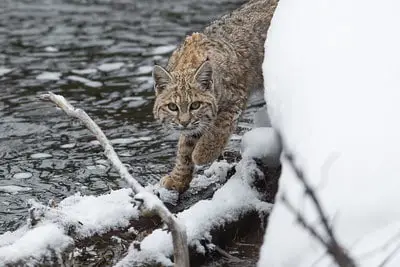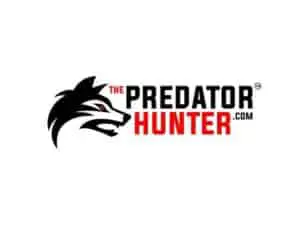The laws for hunting bobcats in Colorado still allow predator hunters to take bobcats. This article covers many of the fundamental laws you will need to know to get started. It also provides information such as seasons, harvest limits, and required permits for bobcat hunting in Colorado.
It is not a legal document and is not intended to cover all hunting laws and regulations. In 2022, Colorado introduced legislation to prohibit, among other things, bobcat hunting. That measure failed to become a law—but who knows what the next few years may bring. Hunters are encouraged to check for updates every season.

In Colorado, bobcat hunting season runs from December 1 to the end of February. A license is required. Bobcat may be hunted day or night, and there are no bag or seasonal limits.
Beginning March 1, 2021, a youth small game license, a furbearer license, or a furbearer harvest permit in addition to any variation of a small game license or small game and fishing combination license is required to take those species defined as furbearers, except coyotes.
Purchase a Colorado hunting license here.
Check out the Colorado hunting seasons.
First time hunting bobcats? Check out my article on the three vital tips for a successful bobcat hunt.
Did you know you can hunt coyotes in Colorado? Read this article on the laws for hunting coyotes in Colorado.
Related: Learn the rules for fox hunting in Colorado.
General laws for hunting bobcats in Colorado.
Hunting hours.
Legal times to hunt small game and/or waterfowl are one- half hour before sunrise to sunset.
An exception is made for furbearers, which can be hunted from one-half hour before sunrise to one-half hour after sunset. Raccoons, coyotes, bobcats, striped skunks, beavers and red, gray or swift foxes can be hunted at night. See Furbearers under Small-Game Hunting Laws on page 5 for details.
Related: Need access to more properties? Find out how to ask for permission here.
Using artificial light when hunting bobcats in Colorado.
Can you use artificial light when hunting bobcats in Colorado while on private land?
Artificial light (private land) may be used at night to take beaver, bobcat, coyote, gray fox, raccoon, red fox, striped skunk and swift fox on private land with written permission of the landowner, designated agent, lessee, or authorized employee.
Related: Going the budget route? Make sure you pick the right color lens.
Related: Infrared riflescopes for new predator hunter good for 200 yards? Check out this article.
Related: Thinking you want a low budget thermal good for 150 yards? Check out this article.
Callers and decoys. Are permitted for bobcat hunting.
While electronic callers are expensive, mouth and hand callers are less pricey but take time to learn how to use.
Read this article and watch the video to learn how to use a closed reed rabbit squealer.
You can read about some highly effective but inexpensive ($20) decoys here.
You can check Amazon’s price list for callers and decoys here.
NOTE: SMART RIFLES are prohibited, including any firearm equipped with a target tracking system, electronically controlled, assisted, computer-linked trigger, or a ballistics computer. Any gun equipped with a computer processor scope is considered a smart rifle.
Can you use artificial light when bobcats hunting in Colorado on public land?
Artificial light (public land) may be used at night to take beaver, bobcat, coyote, gray fox, raccoon, red fox, striped skunk and swift fox on public lands by permit only, as follows:
a. Each permit shall be valid only for the time, species, and location specified on the permit. No permit will be valid during any deer, elk or pronghorn rifle season or during the 24-hour period prior to the opening weekend; nor during the opening weekend of any grouse, pheasant, quail, turkey or waterfowl season in those areas where such seasons are in progress.
b. An artificial light which is permanently attached to, or projected from within a vehicle is prohibited.
c. Taking shall not be permitted within 500 yards of a dwelling, building, or other structure, or in any area of public concentration where human safety would be jeopardized.
d. Such permit shall be carried while hunting and available for inspection upon demand.
e. Area wildlife managers and district wildlife managers may deny a permit where there is a potential that night hunting activities may result in significant adverse impact on wildlife resources by causing movement of large numbers of big game or otherwise.
Provided further that night hunting permits for bobcat will not be issued on public lands in the Canada lynx recovery area where Canada lynx are known to be present. When one Canada lynx has been taken by a bobcat hunter during the current year’s hunting season no night hunting permits for bobcat will be issued for the remainder of the calendar year in the Canada lynx recovery area or in the area outside the Canada lynx recovery area where the Canada lynx was taken. In such instance, any night hunting permits for bobcat already issued under this provision shall be terminated.
f. A permit shall not be required of any person, member of the person’s family, lessee, designated agent, authorized employee, or identified designee with written authorization when necessary to protect such person’s property. Refer to Chapter W- 17, Damage Caused by Wildlife for applicable regulations.
Pelt sealing requirements for Colorado.
Special Restrictions.
a. All bobcat, or their pelts, shall be personally presented by the licensee for inspection and must be sealed within 30 days after take, or within 5 days after the close of the season, whichever is sooner, with a seal provided by the Division. Any bobcat hide/pelt not having a seal within 5 days after the close of the season shall be illegal and become property of the State. Seals will only be placed on bobcat legally taken in Colorado. No fee shall be required for the inspection and issuance of a legal possession seal, which shall remain attached to the hide until processed. Bobcat hides/pelts shall not be transported, shipped or otherwise taken out of Colorado until the hide(s)/pelt(s) are inspected and sealed. The legal possession seal, when attached to the bobcat or the pelt, shall authorize possession, transportation, and sale thereof. For the purposes of this regulation it is illegal to buy, sell, trade, or barter an untanned bobcat hide/pelt unless a permanent seal is affixed thereto. Only one legal possession seal shall be provided for each hide/pelt.

